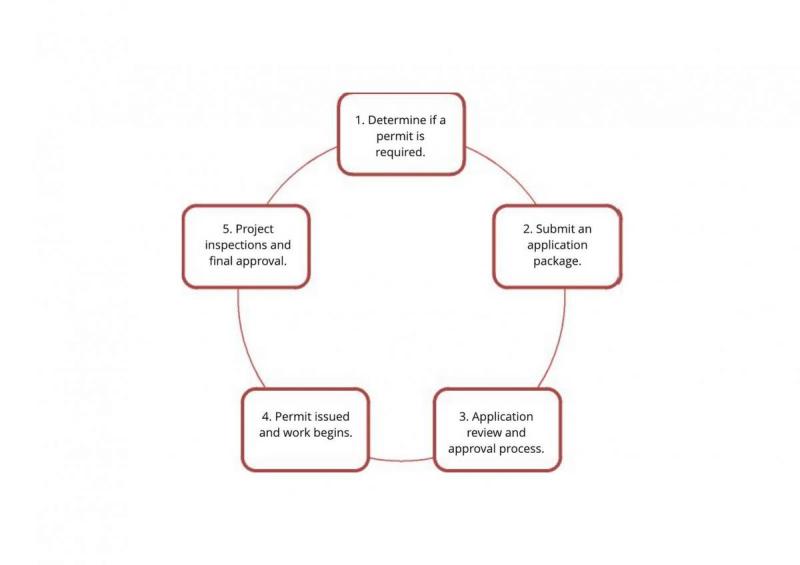Home Owners Guide: When is a Permit Required?

When is a Permit Required?
The State of Florida has adopted a uniform Building Code. All towns, cities, and counties are required to adopt and enforce the Florida Building Codes. The Codes consist of Building, Plumbing, Mechanical, Fuel Gas, Electrical, Accessibility, Energy Code and existing Building Codes. All work requiring a permit must follow the codes as written. The codes cover a wide range of aspects, but are generally to ensure compliance with life safety and proper construction for a safe and efficient environment for occupants. In addition to a safer environment for owners and occupants, insurance companies provide favorable rates for towns, cities, and counties that provide plan review and building inspections for all construction related activity that follow nationally recognized building codes.
In addition to adopting the Florida Building Code, the Town has adopted regulations in its Code of Ordinances to ensure that all development is consistent with the Florida Building Code, the Town’s Comprehensive Plan to ultimately preserve the character and quality of residential neighborhoods and the Town’s commercial community.
Most work done within the Town requires a permit, including all work done within the Town’s right-of-way. Town right of way often includes all land within, or adjacent to Town roads and properties. The following list includes some exceptions to permitting requirements, but may not be a complete list. Before starting any work on your home or business, please check with the Pinellas County Building Department staff to determine whether your proposed work will require a permit.
Pinellas County Building Department staff can be reached at (727) 464-3888.
Work that Requires a Permit:
The following list is not all-inclusive, but represents work that will require a permit to be issued by the Town Building Department:
- All new construction.
- Above ground & in ground pools, spas, hot tubs.
- Accessory buildings: sheds, carport, detached garage, etc.
- Additions & alterations.
- Exterior door replacement.
- Exterior window replacement.
- Renovation of interior and/or exterior.
- Re-roof.
- Docks, seawall, decks* (Requires Special Exception through Board of Adjustment).
- Mechanical HVAC change out, duct work.
- Siding.
- Storm Shutters.
- Screen enclosures.
- Fireplace installation.
- Generators.
- Water heaters.
- Gas tanks above & buried.
- Fences & walls.
- Driveways, sidewalks, & patios.
- Solar panels & systems.
- Repairs & replacement* (See work that may not require a permit section)
- Electrical work.
- Plumbing work.
- Demolition work.
- Retaining walls over three feet.
When is a Permit Not Required?
Work that may not require a permit:
Building Interior:
- Repair & replacement of non-structural interior doors.
- Trim work.
- Carpet & other flooring.
- Painting.
- Cabinets & vanities unless electrical or plumbing will be disconnected and/or altered from the original locations.
- Repairs to walls & ceilings.
- Additional attic insulation.
Building Exterior:
Minor repair and replacement of:
- Small areas of trim & siding.
- Fascia & soffit.
- Broken panels of glass.
- Replacement of window & pool enclosure screening.
- Painting & patching of exterior surfaces.
- Fence repair (individual pickets on an existing fence, not whole panels).
- Roof repairs if less than 100 square foot total area.
- Gutters & down spouts.
Electrical:
Repair and replacement of fixtures and appliances such as only when being replaced in their original location and there is no change to the circuit:
- Light fixtures.
- Ceiling fans.
- Receptacles.
- Switches.
- Refrigerator.
- Range, range hood.
- Replacement of circuit breakers in existing electrical panels.
CAUTION: Electrical work should only be performed by a qualified electrician. Improper electrical work can cause property damage, injury and possible death.
Plumbing:
- Replacement of kitchen or bath sinks, faucets, shower heads and toilets if location is not altered.
- Replacement of garbage disposal if no changes to the electrical or drain line and traps are made.
Mechanical:
- Replacement of components within the system such as fan motors, compressor, refrigerant, coil, thermostat, etc.
- Portable window or wall air conditioners that plug directly into an existing outlet.
NOTE: Replacement of the entire outside condenser unit and/or interior air handler requires a permit.
Swimming Pools:
- Service work, replacement of components with the same as the original such as pool pump, pool pump motor, pool filter.
- Service work for pool heaters.
Trees & Landscaping:
- Replacement of sod.
- Replacement of less than 50% of front yard landscaping.
- Selective pruning and thinning of trees and vegetation as necessary to:
- Maintain the long-term integrity and sustainability of the plant communities; or
- As necessary to survey property lines and structures.
- Pruning, thinning and removal of non-protected trees and understory.
- Removal of trees that may cause imminent personal injury or significant property damage to existing structures.
- Removal of Brazilian Pepper and other invasive and/or noxious plant species on the Florida Exotic Pest Plant Council List of Invasive Species.
Emergency Repairs
Emergency repairs including loss of electrical power, loss of air-conditioning and heat, roof leaks caused by acts of nature can be performed immediately. However, the owner and/or contractor must also:
- Contact the Pinellas County Building Department the next business day to inform the department staff of the type of emergency work undertaken.
- Apply for a Building Permit within 3 business days following the emergency repair, including the submission of all documentation required for the permit.
All repair work must comply with the applicable codes. Upon completion of the work, all inspections must be performed and passed by the Pinellas County Building Department Inspector.

